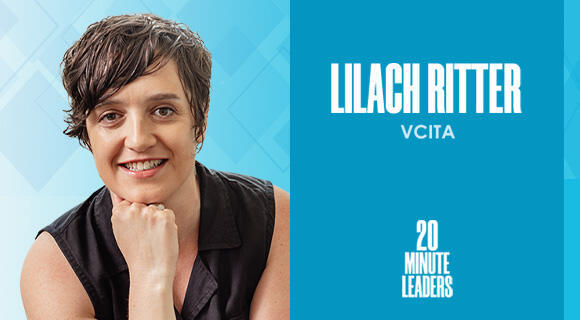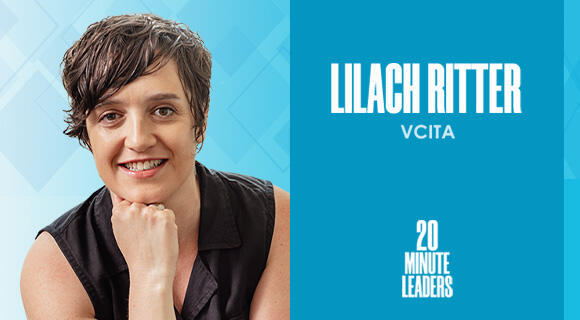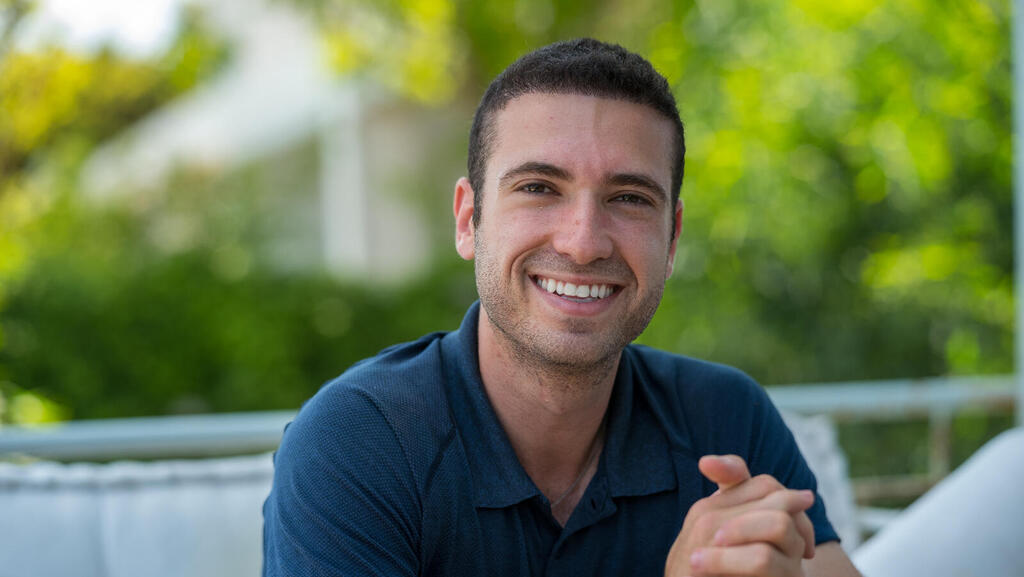
20-Minute Leaders
“I'm still finding my own way to lead in a very true-to-myself way.”
The relationships between people are part of what makes management more of a challenge than technical jobs, says Lilach Ritter, a group leader at VCITA.
The relationships between people are part of what makes management more of a challenge than technical jobs, says Lilach Ritter, a group leader at VCITA. She shares that she joined the tech world as a coder, but now she enjoys the more complex challenges of strategy and people as an engineering manager. One aspect of management she really enjoys is finding the right pairs or small teams of people to work together. Ritter explains that the right partner can bring out the best in someone and help both people advance. She had not thought of herself as a leader early in her career, and when she became a manager, she looked specifically for a female role model. Ritter says she has found bits of help but not one person to really learn from. So she has been finding her own way to lead in harmony and honesty.
Lilach, tell me about your own career trajectory and what have been the main milestones for you.
When I was a developer, I was focusing on one thing, and since I became an engineering manager, I'm focusing on something quite different. When I just started out in tech, it was basically out of curiosity. I was always the technical person. I did a few years of coding. When I stepped up to management, it became a much more diverse challenge, a human challenge and a strategic challenge of how to see the big picture. It became something much more complex than solving technical problems.
What made you make this shift? Was it something that you always knew you wanted to do?
I was actually never passionate about being a leader and a manager. I was offered during my military service to step up and become a team leader, and I always said, "Sorry, that's not me. It's not what I want to do." I never thought of myself as a leader.
I was very surprised to take this step. It was actually a unique situation. In my previous job, I started there when we were really tiny. There was a situation there when my team leader stepped aside to a new position, and he also went out for khufeshatt ledah. I'm not sure of the term in English.
The vacation after you have a kid.
My boss, who was the VP R&D, said, "Listen, Lilach, it's your turn to step up. I think you'll be really good at it." I trusted him a lot. I was like, "They need me. I'll just do it for a few months until we find someone else." I just fell in love quite instantly with the role and the responsibility and the huge rush that it gives you. I was very surprised for the first few months.
Walk me through the thought process of what type of leader you set out to be.
I've been contemplating and thinking about it ever since the first day I stepped up to management. When stepping up to being an engineering manager, I was looking for a role model. My boss was an amazing role model and he taught me so many things. It was very important for me to find a woman leader to look up to. Each person is very different. But there is also something about being a female leader. It's something not very easy to put your finger on. I was very busy looking for this role model, and I didn't really find it. I could find it a bit there and a bit in another place, but there wasn't this real person that I could really look up to, so it was kind of finding my own way. In some ways, I'm still finding my own way to lead in a very honest and true-to-myself way.
Were you able to put your finger on some of those differences as you set your own leadership style and started conversing with other female tech leaders?
For me, it's very important that the leadership is bottom-up. There is something about leading together with the people in harmony and synergy and leveling with the people that you are leading in the most basic way that really helps you motivate yourself and your team in a very natural way.
I think there are some traits that can be perceived as more feminine, more soft or motherly-like, and when all of your other peers are men, sometimes you just get tagged as the more mother-like figure. It's very hard to put exactly your finger on it, but it's something of that sort.
What insights do you have about this dissonance between this overall mission that all of us have in creating equal opportunities regardless of your background or your gender now that you are actually experiencing it firsthand?
I'm going to quote the CEO and founder of VCITA, Itzik Levy. I read an interview that he did once, he said something very simple that really got to me. He said that one of the first hires he did for a very senior management position was a woman. He said, "Once you hire one senior manager that's a woman, the other women will follow because they would just feel more comfortable." It's very simple, but it's true. Once you create an actual diverse place of work that comes from the management and all the way down, the minorities will feel more comfortable coming in to interview and will feel more comfortable coming to work every day. It's basically as simple as that.
Why does that create this exponential effect throughout the growth of the company that makes it much more viable for more female talent to join?
I think as a woman, if at least one or two of the people interviewing you is a woman, you feel more represented and you feel more comfortable to be yourself and show your technical skills or your leadership skills or just who you are.
If you look at your own growth as a leader now and your insights, what are some things that you would tell yourself back at the beginning?
When you are getting to know a person that is part of your team, you need to look at them in two aspects. First of all, you need to look at that person and get to know them as much as possible and understand what makes them tick. What gets them motivated and what gets them excited? Make sure they have those sorts of tasks in their week, month, next half year, or next year.
The other thing is the coupling between two people or between teams. Make sure that a developer is coupled with another developer that would make them shine and reflect their shine on each other. Like say there is this highly technical person, but they are a bit under confident: group them with maybe a more junior person that is confident and that's good with connecting to the rest of the team. That coupling can bring the best out of these two people and actually help them step up and advance in their career paths.
You see that part of your role is to identify what relationships to build within the workplace and what partnerships to create so that people will strengthen each other.
I've seen so many good things come out of people with the right pairing. It can also be a trio or just a small team. But the interaction is priceless.
How do you identify whether a match will be a successful one?
In my last space, because I was there for so long and I knew my developers very well, every time a new developer came into the team or to the group, I would try and detect what would be the first good task for this new person and who they should do it with. Then I would play around with it a bit. You really need to know the people in order to do that. You also can just trial and error.
What do you enjoy most about what you do today?
I think it's two-sided. On the one hand, I love seeing the big picture. I love seeing how the product that we are developing meets our clients and our customers in the field and brings value. The business product development cycle is fascinating to me. On the other side, I love getting my developers engaged into that cycle and also seeing how that brings the best out of them and also helps advance their careers.
Michael Matias, Forbes 30 Under 30, is a Venture Fellow at Innovation Endeavors as well as investment Venture Partner at Secret Chord and J-Ventures. He studies Artificial Intelligence and Human-Computer Interaction at Stanford University, and was an engineer at Hippo Insurance. Matias previously served as an officer in the 8200 unit. 20MinuteLeaders is a tech entrepreneurship interview series featuring one-on-one interviews with fascinating founders, innovators and thought leaders sharing their journeys and experiences.
Contributing editors: Michael Matias, Megan Ryan















